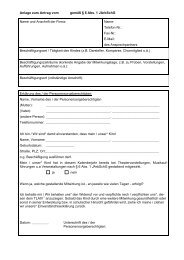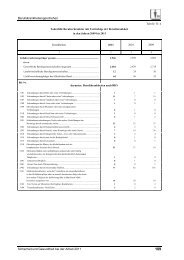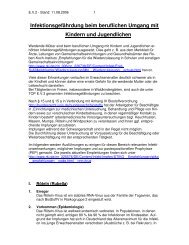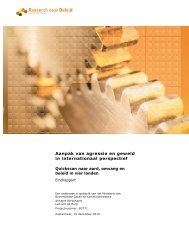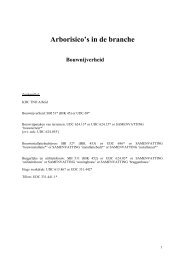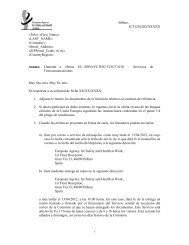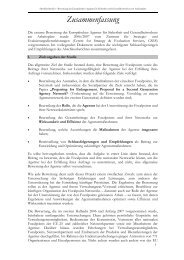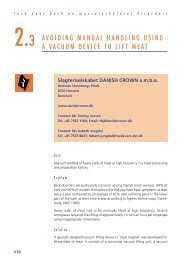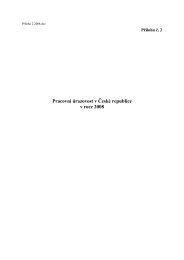Literaturzusammenstellung RSI-Syndrom - European Agency for ...
Literaturzusammenstellung RSI-Syndrom - European Agency for ...
Literaturzusammenstellung RSI-Syndrom - European Agency for ...
Erfolgreiche ePaper selbst erstellen
Machen Sie aus Ihren PDF Publikationen ein blätterbares Flipbook mit unserer einzigartigen Google optimierten e-Paper Software.
ased on workers' compensation data. (Nachdruck).<br />
ND: 038721<br />
AU: Owen, R.D.<br />
TI: Carpal tunnel syndrome: a products liability prospective<br />
TT: Das Karpaltunnelsyndrom vom Standpunkt der Produkthaftung<br />
SO: Ergonomics<br />
CN: Z 504<br />
IM: 37 (1994) Nr. 3, S. 449-476 (6 Abb., 43 Lit.)<br />
CT: Arbeitsmittelgestaltung; Karpaltunnelsyndrom; Produzentenhaftung<br />
Vom Standpunkt des Rechts der USA wird der Problemkomplex des<br />
Karpaltunnelsyndroms im Hinblick auf Produkthaftung behandelt, um Juristen in<br />
der Praxis eine Hilfe zur Bewertung und Entscheidung entsprechender<br />
Rechtsfälle zu geben. Ausführlich wird die historische Entwicklung des<br />
Problems dargestellt. Untersucht werden medizinische Aspekte sowie die<br />
physische Umwelt und ergonomische Faktoren sowie die Gegenmaßnahmen zur<br />
Bekämpfung des <strong>RSI</strong>-<strong>Syndrom</strong>s. Bei gerichtlichen Prozessen, bei denen das<br />
Karpaltunnelsyndrom eine Rolle spielt, sind von besonderem Interesse die<br />
Ansprüche gegen den Gerätehersteller, Fahrlässigkeit, Haftung und Pflichten<br />
des Herstellers, seine Pflichtverletzungen, unterlassene Warnungen u.ä. Die<br />
Problematik der Gefährdungshaftung, der Beweislast, des Mitverschuldens und<br />
der Risikovermutung werden behandelt. Die Entwicklungstendenzen gerichtlicher<br />
Auseinandersetzungen im Zusammenhang mit dem Karpaltunnelsyndrom werden<br />
aufgezeigt. Eine spezielle Checkliste für Kläger und Beklagte ist beigefügt.<br />
ND: 038659<br />
AU: Adams, M.L.; Franklin, G.M.; Barnhart, S.<br />
TI: Outcome of carpal tunnel surgery in Washington State workers' compensation<br />
TT: Ergebnisse von chirurgischen Eingriffen bei Karpaltunnelsyndrom. Auswertung<br />
von Entschädigungsfällen im Bundesstaat Washington<br />
SO: American journal of industrial medicine<br />
CN: Z 581<br />
IM: 25 (1994) Nr. 4, S. 527-536 (8 Tab., 14 Lit.)<br />
CT: Karpaltunnelsyndrom; Rehabilitation; USA<br />
All cases of occupational carpal tunnel syndrome (OCTS) who received surgery<br />
<strong>for</strong> this condition in the Washington State workers' compensation system were<br />
identified using claim and physician billing databases. One hundred ninety-one<br />
incident surgical cases were identified between July 1, 1987 and December 31,<br />
1987, and were followed up a mean of 3 years postoperatively <strong>for</strong> clinical,<br />
disability, and return to work outcomes. Medical record and claim file review<br />
was required <strong>for</strong> clinical and employmend in<strong>for</strong>mation. The mean age off all<br />
patients was 36.6 years, 48% were female, and 40% received bilateral surgery.<br />
The mean time from claim filing to surgery was 187 days. Ninety-eight percent<br />
of cases met the National Institute <strong>for</strong> Occupational Safety and Health (NIOSH)<br />
case definition <strong>for</strong> OCTS. Relief of pain was complete or modest in 86%<br />
(124/145) and only 14% of cases reported no improvement in symptoms. Mean<br />
duration of disability (time loss) postoperatively was nearly 4 months, and 8%<br />
of cases exceeded 1 year of time loss. The majority of cases returned to their<br />
same job (67%) or to a different job (15%). Workers in high risk occupations<br />
were less likely to return to the same job after CTS surgery compared to those<br />
in lower risk occupations (61% vs. 75%). In this population, no association<br />
was seen between any outcome and age, gender, marital status, or baseline<br />
wage. Duration of disability was not significantly related to preoperative<br />
severity of OCTS or to more specific case criteria <strong>for</strong> this condition. These<br />
findings suggest that disability following surgery <strong>for</strong> OCTS may be related to<br />
other medical, psychosocial, administrative, legal, or work-related factors<br />
not evaluated in this study. (Nachdruck).<br />
ND: 038568<br />
______________________________________________________________________________________________<br />
BAuA-Literaturrecherche <strong>RSI</strong>-<strong>Syndrom</strong> (Stand August 2002) Seite 24 von 50




